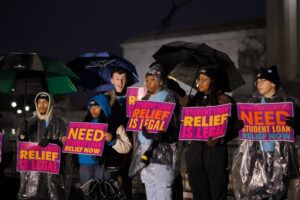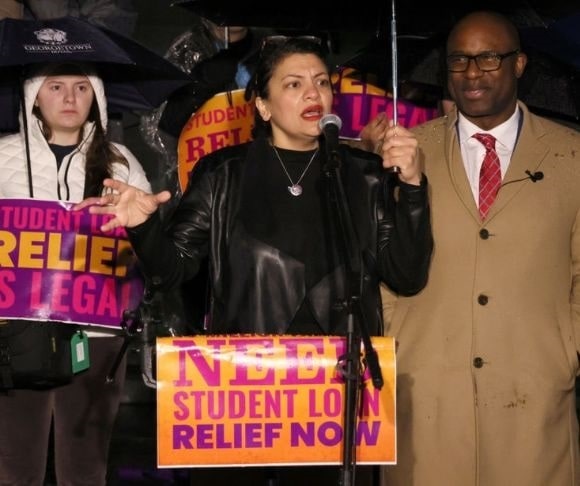On Tuesday, Feb. 28, the Supreme Court will hear a pair of cases on President Joe Biden’s student loan forgiveness plan. At trial, the Court will decide first if the plaintiff may challenge the federal action; then the Court may rule whether the secretary of education acted illegally in granting the relief. The proposal is on hold until the Supreme Court acts, as lower courts have blocked its implementation.
Subsidizing student loans, in addition to loan forgiveness, finds no authorization in the Constitution. However, don’t let that color your opinion of the administration’s chances at the High Court. White House Press Secretary Karine Jean-Pierre said the day before the trial, “We’re confident in our legal authority here.” She may be right.
Not That Brown
In the spotlight are Department of Education v. Brown and Biden v. Nebraska. The first case concerns two individuals, Myra Brown and Alexander Taylor, who do not qualify for the relief and sued, alleging procedural improprieties. The second case consists of Nebraska, joined by Missouri, Arkansas, Iowa, Kansas, and South Carolina, arguing that they will be damaged if the proposal is allowed. Both suits led to injunctions and had an atypical arrival at the Supreme Court. In each case, the government appealed to the Supreme Court to vacate the injunctions. However, instead of ruling on those emergency petitions, the Court said it would treat them like a request for a full hearing and granted them on an expedited basis.
The questions the Supreme Court agreed to resolve are “whether respondents have Article III standing” and “whether the plan exceeds the Secretary’s statutory authority or is arbitrary and capricious.” The standing issue is no small matter, and the Court has a long history of dismissing cases over such concerns. US citizens can’t get a trial on whether a federal government policy is constitutional. They must first show how they have been damaged by policy or how a statute may give them standing.
Standing on Student Loan Forgiveness

(Photo by Jemal Countess/Getty Images for We The 45 Million)
Brown and co-plaintiff Taylor have an uphill battle on the standing issue. Their complaint asserted a single claim, alleging that the administration adopted the plan without required “notice and comment rulemaking.” That a government program benefits someone else does not generally give rise to a claim of legal damages. The state cases are another matter, though. They have alleged a future financial injury from lost revenue on student loans and fewer taxes collected. That is a standing argument with a much greater likelihood of success. If the states win that battle, then comes the question of the statutory authority to issue debt cancellations.
In 2003, Congress passed the HEROES Act, authorizing the secretary of education to “waive or modify any statutory or regulatory provision applicable to the student financial assistance programs” and modify loans “as the Secretary deems necessary in connection with a war or other military operation or national emergency.” Biden announced his plan in August 2022, as federal student loan repayments would start again after years of pandemic-related stays and delays.
Trillion-Dollar Giveaway
Biden promised his policy would “fix a badly broken system,” saying “an entire generation is now saddled with unsustainable debt in exchange for an attempt, at least, at a college degree.” The plan cancels $10,000 of federally held student loan debt for all applicants who make less than $125,000 a year and $20,000 for recipients of need-based Pell Grants. According to a Wharton School analysis, the program would cost just under a trillion dollars if renewed through 2031. The Supreme Court is expected to rule on the case later this spring.




